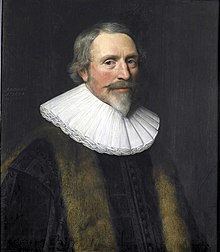Jacob Cats
| Jacob Cats | |
|---|---|

Jacob Cats by Michiel van Mierevelt
|
|
| Born |
10 November 1577 Brouwershaven, Netherlands |
| Died | 12 September 1660 (aged 82) The Hague, Netherlands |
| Occupation | Poet, writer, politician |
| Nationality | Dutch |
| Period | Dutch Golden Age |
| Genre | Emblem books |
Jacob Cats (10 November 1577 – 12 September 1660) was a Dutch poet, humorist, jurist and politician. He is most famous for his emblem books.
Having lost his mother at an early age, and being adopted with his three brothers by an uncle, Cats was sent to school at Breda. He then studied law at Rotterdam and at Paris, and, returning to Holland, he settled at the Hague, where he began to practise as an advocate. His pleading in defence of a person accused of witchcraft brought him many clients and some reputation. He had a serious love affair about this time, which was broken off on the very eve of marriage by his catching a tertian fever (a form of malaria) which defied all attempts at cure for some two years. For medical advice and change of air Cats went to England, where he consulted the highest authorities in vain. He returned to Zeeland to die, but was cured mysteriously with the powder of a travelling doctor (later sources claim he was a quack). He married in 1602 a lady of some property, Elisabeth van Valkenburg, and thenceforward lived at Grijpskerke in Zeeland, where he devoted himself to farming and poetry.
In 1621, on the expiration of the twelve-year truce with Spain, the breaking of the dykes drove him from his farm. He was made pensionary (stipendiary magistrate) of Middelburg; and two years afterwards of Dordrecht. In 1627 Cats came to England on a mission to Charles I, who made him a knight. In 1636 he was made Grand Pensionary of Holland, and in 1648 keeper of the great seal; in 1651 he resigned his offices, but in 1657 he was sent a second time to England on what proved to be an unsuccessful mission to Oliver Cromwell.
Cats retired to the seclusion of his palatial villa "Sorghvliet" ("Fly From Care"), which was surrounded by a vast and sumptuous formal garden; the garden (now a park) became internationally famous and featured in 17th-century collections of engravings of famous European gardens. (Located near the Hague, and now known as "Catshuis", the house has survived and is now the official residence of the Dutch Prime Minister). Here he lived from this time till his death, occupied in the composition of his autobiography (Eighty-two Years of My Life, first printed at Leiden in 1734) and of his poems. He became famous in his own lifetime from his moralistic Emblem books, most notably Sinne en Minnebeelden, for which Adrian van der Venne cut the plates. He died on 12 September 1660, and was buried by torchlight, and with great ceremony, in the Kloosterkerk at the Hague. He is still spoken of as "Father Cats" by his countrymen.
...
Wikipedia
